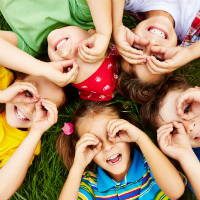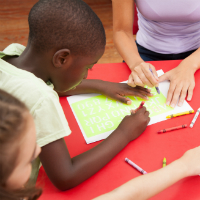
CHILDREN & YOUTH OUTPATIENT SERVICES
(Healing Trauma in Children and Youth and Adults using CBT Interventions)
Our children and youth outpatient services focus on Trauma-focused cognitive behavioral therapy (TF-CBT) is an evidence-based treatment model designed to assist children, adolescents, and their families in overcoming the negative effects of a traumatic experience. This evidence-based method has been proven effective for treatment after multiple traumas or a single traumatic event, and therapists trained in TF-CBT are frequently able to help children experiencing the emotional effects of trauma address and resolve these effects.
How TF-CBT Works
In TF-CBT, interventions are specifically tailored to meet the needs of children, adolescents, and adults experiencing emotional and psychological difficulties. Both parents and children may become able to better process emotions and thoughts relating to a traumatic experience through TF-CBT, which can provide those in therapy with the necessary tools to alleviate the overwhelming thoughts causing stress, anxiety, and depression.
A. Intensive Home Base
Home-Based Services are a combination of individual therapy, family therapy, crisis intervention, case management, care coordination, and family collateral contacts. These contacts may be with the identified person served or with collateral family members. Collateral contacts are used to obtain information as necessary to plan appropriate treatment or to assist family members so they can respond therapeutically to the identified child's problems, needs, and/or behaviors.
B) KIDS PLAY THERAPY
Our Services Include:
| Evaluations | Individual therapy sessions | Group sessions (feeding, social skills, fine motor, sensorimotor, aquatic) |
| Integrated Listening System | Parent/caregiver education | Home program development |
| Consultation for IEP/ IFSP meetings | Aquatic Therapy program | |
Collaboration with other health care professionals and school providers for integrated services.
C) INDIVIDUAL & FAMILY THERAPY
This is a treatment activity designed to reduce maladaptive behaviors, maximize behavioral self-control or restore normalized psychological functioning, reality orientation, motivation and emotional adjustment, thus enabling improved functioning and more appropriate interpersonal and social relationships. Restoration of normalized psychological functioning often involves the resolution of trauma-inflicted injury, improved self-esteem, or building of ego strengths.
Types of therapy offered are:
| Supportive psychotherapy | Behavior interventions | Cognitive restructuring |
| Cognitive behavior therapy | Insight-oriented psychotherapy | Psycho-educational therapy |
| Play therapy | Infant-parent psychotherapy | Trauma resolution therapy |
| Structured family therapy | Sex abuse therapy | Supportive family therapy |
| Individual & Family play therapy | Activity therapy |
D) GROUP THERAPY
This is a treatment activity designed to reduce maladaptive behaviors, build healthy communication, build attachment relationships and cohesion, improve social skills, and improve general emotional adjustment, thus enabling improved functioning and more appropriate interpersonal and social relationships.
Types of group therapy provided are:
|
|
|
|
|
E) PSYCHOLOGICAL, NURSING, & PSYCHIATRIC SERVICES
Psychiatric evaluation: A comprehensive evaluation, performed face-to-face by a psychiatrist, which investigates a person's clinical status, including the presenting problem; the history of the present illness; previous psychiatric, physical, and medication history; relevant personal and family history; personal strengths and assets; and a mental status examination. This examination concludes with a written summary.
Medication review: The process of evaluating and monitoring medications, their effects, and the need for continuing or changing the medication regimen.
Psychological Assessment: Psychologists meet with clients to identify problems—emotional, mental and behavioral—in their lives. Through observation, interviews, and tests, the psychologist will diagnose any existing or potential disorders. Then, together with the client, they formulate a program of treatment according to the client’s needs.
Psychiatric Nursing Services: Mental health nurses work closely with a Psychiatrist and mental health consumers. They are experts in assessing, diagnosing and treating people with psychiatric problems. Mental health nurses work as part of a team to provide total medical care for the patient. Some of the common duties of a mental health nurse include:
|
|
|
|
|
|
F) RESPITE, SUMMER CAMP; AFTER SCHOOL, CHILDCARE:
After school, Childcare, Respite and Summer Camp are options for the parents of children who receive other services with Family360. These services are provided as a relief to the parents, but also as an opportunity for the children to participate in normal activities with other children.
G) SUICIDE & SELF-HARM BEHAVIORS
Dialectical Behavior Therapy (DBT) is a treatment designed specifically for individuals with self-harm behaviors, such as self-cutting, suicide thoughts, urges to suicide, and suicide attempts. Many individuals with these behaviors meet criteria for a disorder called borderline personality (BPD). It is not unusual for individuals diagnosed with BPD to also struggle with other problems -- depression, bipolar disorder, post-traumatic stress disorder (PTSD), anxiety, eating disorders, or alcohol and drug problems.
Individuals in DBT receive four main modes of treatment:
Individual therapy |
Skills group | Peer support services |
| Phone coaching | Weekly individual sessions | Attend a two and a half hour weekly skills group for at least one year. |
The skills groups are classes during which individuals learn four sets of important skills - Mindfulness, Interpersonal Effectiveness, Emotion Regulation, and Distress Tolerance.
H) JUVENILE JUSTICE PROGRAM
| In-Home Detention | Victims of Sex/Human Trafficking | Social Services |
| Working with the courts/juvenile justice system | Delinquent Services to Children in their Own Homes (SCOH) | Psychiatric and Medication Management |
| Assessments | Case Management | Individual and Family Counseling |
| Chemical Dependency | Support Groups | Community-Based Residential Detention |
I) GANGS, ANGER MANAGEMENT, TRAUMA, AND VIOLENCE
The emotion of anger is neither good nor bad. Like any emotion, it is conveying a message, telling you that a situation is upsetting, or unjust, or threatening.
GRASP (Gangs Rescue and Support Project) GRASP is based on a highly successful program of Metro Denver Partners, a non-profit organization, that for over 45 years has helped kids to better futures through one-on-one mentoring is a peer-run, intervention program that works with youth who are at-risk of gang involvement or are presently active in gangs, helps families of gang victims, and serves as a youth advocate.
Services:
| Assessments/Evaluations | Chemical Dependency | Community and School Outreach |
| Counseling Peer Support | Crisis Response | Family and Youth Advocacy |
| GED | Groups | Hospital Intervention |
| Job Training | Parent Awareness Training | Tattoo Removal |
| Trauma/CISD |
J) MENTORS MATTER
For a few hours a week, a couple days a month, you can give a child the irreplaceable gift of your friendship. Have you ever thought of yourself as a mentor? The majority of our volunteers haven't either, but they are changing the lives of kids every day.
All young people have the potential to succeed in life & contribute to society. However, not all children get the support they need to thrive; you can change that. Play a board game, make fun crafts, take a hike; just as your options are limitless, so is your mentee's potential.
Kids with Mentors are more likely to:
| Have better attitudes towards school | Have higher self-esteem | Avoid risky behavior |
| Get along better with adults and peers | Have improved interpersonal skills | Hold leadership positions |
| Become a Mentor themselves |
Ready to become a MENTOR? Our Mentors have fun and experience personal growth. Call today, a monthly stipend is provided for mileage and expenses for working with each Mentee
k) TRANSITIONAL SERVICES FOR TEENS & YOUNG ADULTS (Age 16-25)
Approximately 4.2 million young people experienced homelessness in America within one year. More than 3.5 million were young adults ages 18-25, with one in every ten young adults experiencing some form of homelessness in a year. Over 700,000 13-17-year-olds in America were homeless and on their own. Approximately one out of three homeless young women were pregnant or parenting—a number highest in rural communities.
Services:
| Alcohol & Drugs | Anger and Rage | Boundaries/Limit setting |
| Case Management | Clothes | Credit |
| Depression | Food and Mood | GED |
| HIV/Safe Sex Practices | Homelessness | Housing |
| Independent Living skills | Independent Living Skills | Individual and/or group counseling |
| Interpersonal skill-building | Job Readiness Skills | Mental, Medical, Pharmacy, and Dental |
| Money Management/budgeting | Nutritional Needs | Peer Support |
| Pregnant and Parenting Teens | Psychiatric & Medication Management | Runaways |
| Sex Addiction | Sex/Human trafficking | Teens & Porn |
| Trauma, Addictions, & Substance Abuse | Youths transitioning out of Foster Care |
L) CREATIVE ARTS FOR MENTAL HEALTH
Family360 and Hosanna Ministries Mental Health recognizes that creativity is an important pathway to healing the heart, mind, and soul. The classes help people learn to channel their creativity in positive directions. Creative arts are outlets consumers can use to replace negative behaviors such as self-harm, addiction, and suicidal thoughts.
Services:
We sponsor art, poetry, creative writing, dance, drama, and music classes for the adults we serve. We use the Medicaid program, grants, and other funds to sponsor staff and materials for these classes. Students can join by asking their case manager or therapist to include one or more of the classes in their plan of service.
Classes usually take place weekly at the specific dates and times.
Consumers improve their lives through:
|
|
|
|
M) SCHOOL-BASED SERVICES
In-School Services provided by school-based teams include:
Academic Tutoring/Assistance |
After School/Homework Assistance/Summer Camp | Assessments |
| Behavioral modification | Bullying | Career Interests |
| Case Management | Chemical Dependency | Coping skills Modeling, one-to-one and/or group rehabilitation |
| Crisis intervention | Individual, family, and group counseling | Medication Management |
| Parent Intervention | Psychiatric and Psychological Assessments | Trauma Assessment |
| Truancy |
N) TAMAR’S PROJECT: Sex Abuse (2 Samuel 13)
At Family360, we have created a safe, nurturing environment for survivors of sexual abuse that provides the support necessary to heal. Sexual trauma takes many forms. It can be one event or a series of events that may escalate over time. Sexual harassment, rape, inappropriate touching, being pressured to engage in sexual activity by threat of harm are all forms of sexual trauma.
For those whose sexual trauma occurred in childhood the feelings of shame and the instinct to blame themselves can be much stronger. As adults, they may be less skilled at self-protection and may unknowingly put themselves in danger of further victimization and exploitation by being more vulnerable in dangerous situations.
Those who have survived sexual trauma can experience a wide range of symptoms making diagnosis and treatment a challenge. These include:
| Addiction | Anxiety | Depression |
| Difficulty setting safe limits with others and relationship problems. | Sexual anxiety and disorders, including having too many or unsafe sexual partners. | PTSD |
| Poor body image and low self-esteem | Self-harm, or eating problems |
Comprehensive Treatment
Our approach balances accurate assessment and diagnosis with sophisticated treatment and careful discharge planning.
| Art Therapy | Equine Assisted Therapy | Psychodrama |
| EMDR | Individual Therapy | Family Therapy/Involvement |
| Group Therapy | Somatic Experiencing | Outdoor Adventure |
| Trauma Assessment | Movement Therapy | Yoga, etc. |




